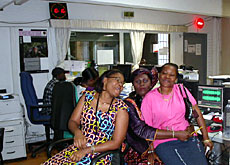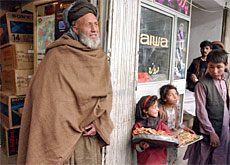Swiss-backed radio in Congo triumphs over odds

A Swiss non-governmental organisation has been helping to build peace in the Democratic Republic of Congo by setting up an impartial radio station network.
swissinfo’s Bernhard Meili recently went on a one-month trip to Congo – one of Africa’s biggest and most unstable countries – to report on Radio Okapi’s future.
Radio Okapi was set up in early 2002 by the Hirondelle Foundation, a Lausanne-based NGO that helps establish independent media in countries emerging from conflict.
The foundation works in tandem with the United Nations, and in the past has set up similar radio stations in Rwanda, East Timor and Kosovo.
Congo represents the largest radio project for the foundation and the UN. Apart from the network’s centre in Kinshasa, there are six regional stations with plans for four more in political and military hotspots.
The station, which is based in UN Observer Mission to Congo (MONUC) compounds, aims to be the voice of neutrality in a country that is still feeling the effects of a five-year war.
An estimated three million people died in the conflict between the government and rebels, which officially ended with a peace agreement in 2003. But the government still has no control over large areas of the mineral-rich country and tension is high in the east.
Vital resource
Meili, who is head of IT operations at swissinfo, said that the radio was a vital resource for the population.
“In a country like Congo where you have a lot of crises and people are very uncertain… information is extremely important and it may even be a question of life or death in certain situations,” said Meili.
Meili, whose expertise is in the technical side of radio, travelled around Congo as part of a team looking into the future of Radio Okapi if the UN were to pull out of the country. He visited not only Kinshasa, but also the less stable border towns of Goma and Bukavu.
“It would be a huge difference from today’s situation [if the UN pulled out], because if the UN is no longer there, then a lot of infrastructure such as electricity generators will no longer be available,” said Meili.
Fragile
According to Meili, the fragile security and political situation are the biggest challenges facing the radio network.
Another problem is logistics. This includes not only having to import specialised pieces of broadcasting equipment, but also the simple task of getting people to work in a country where many of the roads are still dirt tracks.
Meili said the high costs associated with security and logistics meant that broadcasting in Congo was almost as expensive as in Switzerland, despite salary costs being much lower.
About 100 – mostly Congolese – journalists work at Radio Okapi, earning on average $400-600 (SFr500-750) a month. The whole project is currently funded by the Swiss and British governments.
Positive
Meili said that the radio – which broadcasts news, music and information about MONUC activities in five languages and in several local dialects – was very well received by the population.
By offering impartial information, the radio aims to promote peace and encourage dialogue across the political divides. There are also programmes devoted to health, education and human rights issues.
The IT specialist said that people working at the radio stations were very dedicated and had many skills that were not always found in Europe.
“For example, its amazing how people work together – they have a concept of teamwork that we can only dream of,” commented Meili.
Meili and his colleagues have recommended that, if the UN pulls out, the radio should scale back to ten radio stations and use solar power for its energy needs.
And although Meili says it is difficult to say what will happen to Radio Okapi – named after a giraffe-like animal, which is also a symbol of peace – it is definitely worth investing in its future.
“It’s an important part of humanitarian work and is really something that we can’t ignore and that we should support as much as we can,” he said.
swissinfo, Isobel Leybold-Johnson
Democratic Republic of Congo
Population: 52.7 million.
Area: 2.34 million sq km – two thirds the size of Western Europe.
Life expectancy: 41 years (men), 43 years (women).
GNI per capita: $100 (SFr124).
Main exports: diamonds, copper, coffee.
The five-year war pitted government forces supported by Angola, Namibia and Zimbabwe against rebels back by Uganda and Rwanda.
There has been a fragile peace agreement and power sharing government in place since 2003, but some sporadic fighting continues.
An estimated 3.3 million people died in the conflict over the period 1998-2002.

In compliance with the JTI standards
More: SWI swissinfo.ch certified by the Journalism Trust Initiative












You can find an overview of ongoing debates with our journalists here . Please join us!
If you want to start a conversation about a topic raised in this article or want to report factual errors, email us at english@swissinfo.ch.